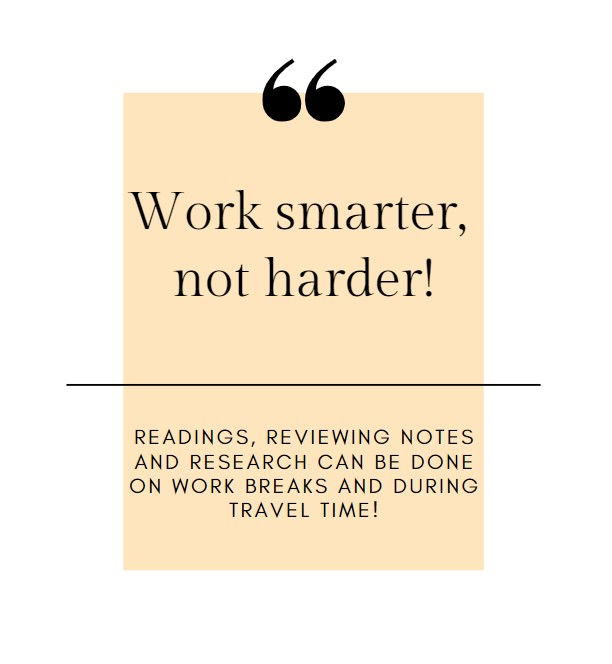Studying and working? Why do we do it and how can we perfect it
- Brianna Seedsman
- Jul 16, 2020
- 6 min read
If you picture everyone you've shared university/college/TAFE classes with over the years, it would probably be difficult to pinpoint someone who doesn't have at least a part-time job. A 2008 study found that around 70% of students have part-time or full-time jobs. The number has more than likely increased by now.
There are many reasons that students work, and it typically is not to be able to fund basic necessities. Sometimes it can simply be for experience, extra pocket money or to keep busy (especially during mid-semester breaks).
It's not just your stock-standard retail and fast-food jobs anymore either. More and more students are taking up part-time or full-time work within a career that relates to their field of study and professional workplaces are starting to adapt to this change of pace and are keen to hire juniors and interns, both to provide the experience and to have a helping hand around the office.
"If I'm spending my time working, might as well spend it as beneficially as I can and relate it to my career. That way I'm getting money AND experience, which for some industries is equally important, if not more important, than having a degree." [Tanisha Prasad; Bachelor of Commerce; Fourth Year]
Why we work and study
Depending on the type of job, whether it is related to the field of study or not, can determine whether a student is partaking for experience. Engaging in relevant work can lead to higher chances of landing a career-relevant job after graduation. Students also learn valuable 'soft skills', such as time management and communication skills, when working, which, if employed in the relevant field, can greatly improve not only their chances of future employment but also improves their grades. This is most commonly seen in the hospitality industry, as techniques learnt in the classroom can be instantly applied to your work.
"It's the best way to jumpstart your career, rather than completing a course with no work experience in the field you want to enter!" [Jasmine Cassidy; Patisserie Cert III & IV]
Most students say that they work because it gives them financial independence from their parents. While most Australian students live at home when studying, being able to pay for daily expenses (i.e travel, phone, food) and having that extra income for nights out or a Friday night pub feed makes all the difference. Asking for money is never easy, even if it's from your parents, so having some form of reliable income is a boost in self esteem for a young person.
A reason that is becoming common is to keep ourselves busy, especially when mid-semester breaks come around. Involvement in diverse activities, like tertiary study and a job, keeps your mind and body active. When one of these activities stops, it can be a shock to the system, and having a job can fill the gaps for the short period. If you can't commit to work while also studying, holiday work is a popular option for students looking for something to do.
Impacts to consider
Generally speaking, time spent at work is at the expense of time spent in recreational activities (socialising and on-campus activities) and study. This can affect educational performance and the relationships between peers, friends and family.
This is where a well-planned schedule can help out if you don't want to loose valuable social time. Fourth year commerce student Tanisha suggests keeping specific time slots open during the week for valuable family and friend time, and that balance is key. Seeing friends less often during peak periods is a sacrifice that has to be made and can be 'made up' during semester breaks and less busy periods.
"Learning time management and how to plan in advance comes naturally with having to balance work and study."
This can't always work though, especially for those in VET courses, which usually translate to early hours and weekend work. Planning things well ahead is key to balancing commitments and social outings, thought it won't always work out so don't make yourself or your friends and family feel guilty for not being able to see each other often.
"I do miss out on some things, but I try to not let it affect me." [Jasmine Cassidy]
If you find your energy is depleted, which is bound to happen eventually, seeking professional help could be one option. Another is finding doable activities in your everyday life that can provide a good mental release and energy booster. See "me time" below for some suggestions.
Finding that ideal balance
Finding a balance is not easy and can depend on the type of work, course demands, academic ability, previous experience, future career paths, course fees, time commitments and availability of other means of financial support.
There are however some general tips and tricks that current and past students are passing on to the new generation of working students.
Make a schedule (and stick to it!)
Most students have part-time or casual work in retail or the hospitality sector, making it super easy to work around a busy university timetable. Tell your employer right away what hours are committed to school, and what hours of the day can be spent working.

When picking class days and times, try and find a schedule that works for you. Whether that's picking classes that are scheduled only on 2 or 3 days of the week and working the other 4 or 5, or spreading them out to one class a day so you can work every day without burning out. If you're struggling with your schedule, seek advice from a school advisor, a Higher Education Manager, counselor, professors, alumni or other students who have mastered their own schedule.
"Keep slots open in your week specifically to see friends and spend time with family and to NOT study. It's also super important to not bash yourself when you have to work during the day and find you can't study at night."[Tanisha Prasad]
Do not procrastinate!
A majority of students are guilty of procrastinating but it's a horrible habit to have.

At the end of the day, your studies should be first priority and shifts at work might have to lessen during peak exam and assessment periods.
At the start of a semester, take note of all due dates or exam dates, and dedicate times during the weeks leading up to them to solely work on these assessments. Schedule days off or swap shifts to work around these due dates. Leaving it to the last minute will cause panic that can ultimately be avoided.
Stay healthy; dedicated 'me time'
Even though study and work are high on the priority lists for most students, your health and well being can come above them. Having a daily or weekly hobby (like gym, yoga, sports or crafts) will keep you physically stimulated and clear your mind from the stresses of work and school. Eating healthy and drinking plenty of water will make your body feel good but also has positive effects on your psychological well being as well. If during peak exam periods you find yourself overworked and burnt out, taking a day or two for some 'me time' is completely okay. Mediate, watch your favourite TV show, go for a day out with friends, try out a pottery class. Sometimes a break in routine is enough to reinvigorate you.
Don't be afraid to say no!
This is one of those things that most young people struggle to do but it gradually becomes easier as you grow up and have more pressing commitments. It's okay to say NO sometimes, even if it will upset someone. It's okay to say no to that 'girls night out' that happens to be the same night that you're expected to be at work. Cutting back extra-curricular's that you realise don't have time for to instead focus on course work is normal.

If it's too hard to think of the foreboding word, try compromise instead. "I will come out for a few hours but will have to leave early!" or "I can't commit to all of these extra-curricular's but can manage maybe one."
Be passionate about what you do!
There's no point studying something just for the sake of it, or to please someone else. You have to be passionate about what you're studying, and therefore passionate about the job you're going to have in the future. The same goes for the job you currently have. Adults will tell you to 'just settle for whatever you can get' but you don't want to be dreading work. Do something you have an interest in, even if it's not ultimately what you'll end up doing in the future. A step to the side is better than a step backwards. Don't be afraid to say YES to internships and apprenticeships, even if they're not offering a good pay. Any experience is welcomed experience.

"Welcome your apprenticeship with open arms! First hand experience is so important and helps with your future career. Don't be afraid to ask questions!" [Jasmine Cassidy]












Comments